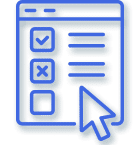What does an Addiction Counselor in South Dakota do? What is Their Job Role?
There has never been a greater societal need for mental health substance abuse counselors than there is today. Such alcohol and drug counselors work in community addiction centers, hospitals, prisons and other facilities, helping those battling drug and/or alcohol addiction retain sobriety. The federal Bureau of Labor Statistics forecasts healthy job growth in the field, with an estimated 23 percent growth rate over the next decade. The median pay for substance abuse counselors was $43,300 per year as of May, 2017.
Compare Popular Online Substance Abuse Counseling Programs
Overview
The South Dakota Board of Addiction and Prevention Professionals, known as BAPP, based in Sioux Falls, oversees eligibility and certification requirements for substance abuse counselors in the state. BAPP is a state office operating under the auspices of the South Dakota Department of Social Services.
South Dakota Licensing & Certifications for Associates & Independent Counselors
South Dakota offers two levels of counselor: Certified Addiction Counselor (CAC) and Licensed Addiction Counselor (LAC). The latter requires a master’s degree in a human services-related field. Once licensed, a LAC may practice privately, which is not an option for the CAC counselor.
Education Requirements

South Dakota does not require CAC level candidates to have earned a degree, but higher education is always helpful in the job market. The minimum CAC educational requirement is one year of fulltime addiction-related coursework from a BAPP-approved institution of higher learning. The 27 hour minimum of this special coursework must include one three-hour course in these subjects:
- Introductory course in alcohol use and abuse
- Introductory course on drug use and abuse
- Alcohol and drug treatment services continuum
- Group drug and alcohol counseling
- Individual counseling foundations
- Family counseling for alcohol/drug abuse issues
- Addiction professional ethics
- Diverse populations
- An elective in substance abuse studies
The LAC candidate must complete a required seven courses, with a minimum of five at the graduate level. These courses include:
- Addiction counseling techniques and theories
- Assessment and case management
- Treatment planning
- Clinical supervision
- Multicultural competency
- Psychopathology or psychopharmacology
- Professional, legal and ethics standards.
For both CACs and LACs, a minimum of a C grade is required in each course for accreditation.
If a person has a high school education or GED, he or she may begin working as a South Dakota Addiction Counselor Trainee (ACT). ACT South Dakota credentialing requires hiring as a paid worker or acceptance of a voluntary position. A person may remain an ACT for up to five years, but annual renewal is required.
Residency and Work Requirements

In order to qualify for testing in South Dakota, the applicant must reside and /or work in the state at least 51 percent of the time.
Work experience requirements for accreditation and licensure must include supervised experience requirement specific to substance abuse. The number of required hours depends upon the applicant’s educational level. Those with a high school diploma or GED must complete 8,000 hours; an associate’s degree, 6,000 hours; bachelor’s degree, 4,000 hours and with a master’s degree or higher, 2,000 hours.
Applicants must provide documentation in depth of their 300 minimum hours of supervised practical training, along with proof of the 10-hour minimum for each core activity.
Clinical Supervision Explained
South Dakota’s requirements for work experience require clinical supervision. All clinical supervisors must be a CAC or LAC in good standing. The clinical supervisor evaluates the candidate’s core functions and experience, documenting this information for the candidate’s certification or licensure application. Clinical supervision includes at least eight hours of contact with the candidate per month. The clinical supervisor may directly observe the candidate working via videotape or observe live sessions. Face-to-face supervisions must take place when possible, and only half of the required clinical supervisions hours may be performed electronically, such as via email, teleconferencing, video-conferencing and the like.
Find Your Online Addiction Counseling Program
Clinical supervisors must know all pertinent certification and licensing standards so that candidates are properly supervised. If the candidate has not developed up to a minimally acceptable performance standard, the clinical supervisor cannot recommend certifying or licensing the individual.
(CACREP) or (CORE) Licensure and Certification

When the mental health counseling candidate has completed all educational and work experience requirements, they are eligible to apply for certification or licensure. Request an application packet in writing from the BAPP and pay the application fee. An alternative is downloading the application from the BAPP website, for which there is no charge. For the March testing cycle, applications must be in by January 1, and the deadline is July 1 for the September testing cycle. The BAPP recommends starting the application process at least two months prior to the deadline. For application materials to be considered, they must include the following:
- Employment information/address.
- Written job description of current position.
- Educational and academic data form.
- Official school transcripts, sent directly to BAPP by the postsecondary institution.
- Three professional recommendations.
- Signed professional code of ethics form.
- Signed Authorization and Release of Information form including a non-felony statement or completion of all felony sentencing requirements.
- Supervisor's Evaluation and Recommendation form indicating the application meets all competencies.
- Work History Documentation and Work Experience Verification forms.
- Documentation of 300 hours of supervised practical training with the minimum of 10 hours in each core activity.
- Required fee payment.
If the BAPP approves the application, the candidate may then take the written examination necessary to pass to receive certification or licensure.
CACREP Accredited Online Certification

Two types of accreditation are recognized in the United States; institutional and specialized. Institutional accreditation takes the entire institution into account while the specialized focus on professional preparation programs. The Council for Accreditation of Counseling and Related Educational Programs (CACREP) is a specialized accreditation that focuses on master’s and doctoral degree programs in counseling at colleges and universities worldwide. Only already-accredited institutions are eligible for CACREP review. The review for accreditation will center on programs offering graduate degrees in counseling.
Choosing a CACREP-accredited program ensures that the program meets the highest of quality standards. Many alcohol and drug counseling specialties are accredited bythe CACREP, including South Dakota addiction counseling. Accredited addiction counseling programs prepare individuals to work with those affected by addictive behavior and their families. Addictive behaviors include alcohol, drugs, food, gambling, sex, and anything else that negatively affects your personal or work life by creating addiction behaviors.
CACREP-accredited programs will focus on treatment models and the phases of addiction including prevention, recovery, and relapse prevention. These 60-semester hour programs will include the application of interventions. When students choose a CACREP-accredited program they can be confident that:
- the program meets or exceeds national standards
- the program will focus on professional counseling rather than psychology oreducation
- the program has an excellent reputation
- CACREP graduates statistically receive higher scores on the National Counselor Examination for Licensure and Certification (NCE).
- the requirements for licensure will be met.
Board of Examiners for Addiction Counselors and Marriage and Family Therapists
The South Dakota Board of Examiners facilitates licensure of qualified applicants for mental health professionals including Addiction Counselors and Marriage and Family Therapists. South Dakota counseling licenses require a passing score on the National Board for Counselor Certification (NBCC) National Counselor Examination (NCE).
The Board of Addiction and Prevention Professionals regulates the specific practice of alcohol and drug professionals. The Board ensures ethical conduct according to accepted South Dakota and national standards in Addiction Counseling.
Address
1351 N. Harrison Ave.
P.O. Box 340
Sioux Falls, SD 57501
Phone
(605) 224-1721
Website Address
https://dss.sd.gov/licensingboards/examiners.aspx
Licensure:
- Licensed Professional Counselor – Mental Health (LPC-MH)
- Licensed Professional Counselor (LPC)
- Licensed Marriage and Family Therapist (LMFT)
Counselor Testing & Examination Process

Candidates must take the International Certification and Reciprocity Consortium (IC&RC) written examination.
Written examinations are scheduled twice yearly, in March and September. These examinations are conducted via Computer Based Testing (CBT). A candidate schedules his or her own date, time and testing place within a two-week period, as long as BAPP approves their application and pre-registers the candidate for the exam. If the candidate does not pass their initial written exam, BAPP will set the schedule for retesting. Applicants must submit a letter of intent for re-testing and pay applicable fees. Both the letter of intent and the fee require receipt by the BAPP by January 1 or July 1 before the next testing cycle to take the retest during that cycle. The applicant may retest two times, but only during the next two testing cycles. If the applicant does not pass the test by the third attempt, he or she is required to complete all current requirements for certification or licensure, as well as complete another application and pay applicable fees before taking the exam again.
Renewal and Continuing Education
Certification and licensure is renewed annually, and South Dakota uses the applicant’s birth month as the time for renewal. Currently, the fee for certification renewal is $175.00, while the fee for license renewal is $200.00. BAPP must either receive the renewal by the final day of the applicant’s birth month, or the renewal must show a postmark by that date.
Forty hours of BAPP- approved continuing education, or training as it is referred to in South Dakota, are required for BAPP submission every two years. Those practitioners with dual credentials must submit 60 hours every two years. These continuing education hours are sent to BAPP during the individual’s birth month every other year in even-numbered years.
Receive approval for continuing education or training by submitting the “Request for Approval of Continuing Professional Training” form from the BAPP website. The applicant must also submit documentation describing the event and its subject matter, such as an agenda, brochure, instructor qualifications and other pertinent information. Submit the form for approval a minimum of one month either before or after the date of the event or training.
Reciprocity
BAPP allows the transfer of credentials from addiction or prevention professionals certified by an IC&RC board at a reciprocal level when they relocate to South Dakota. The applicant for reciprocity does not have to fulfill any additional requirements when transferring their reciprocity to South Dakota using this method. Start the reciprocity process by contacting your current credentialing board and request information on reciprocity eligibility. If eligible, ask for a reciprocity application. Once completed, submit the application and a check for $150 made out to the IC&RC to your current board. The current credentialing board will complete a credential verification report and forward all documentation and payment to the IC&RC. When BAPP receives this reciprocity approval notification from the IC&RC, it will send a reciprocity information form asking for address and employment information, along with a request for a signed Professional Code of Ethics form and a signed Authorization and Release of Information form to the applicant. Once the required information is received, BAPP issues a certificate for the equivalent credential. For example, those earning an Alcohol and Drug Counselors (ADA) certificate from their former jurisdiction will receive CAC certification.
Should the reciprocity applicant fail to submit complete and accurate responses to BAPP’s information request, or if the applicant has been convicted or pled no contest or guilty to a felony offense within five years of the reciprocity application date, BAPP may deny the request. If someone has a felony record, they must sign releases allowing BAPP to verify the individual’s current status.
Potential Counselor Career Path Options
- Addiction Counselor
- Alcohol and Drug Addiction Counselor
- Behavioral Health Specialist
- Certified Addiction Drug and Alcohol Counselor
- Chemical Dependency Counselor
- Mental Health Counselor
- School Counselor
- Substance Abuse Counselor
Associations & Organizations
Along with BAPP, the state also has the South Dakota Association of Addiction & Prevention Professionals (SDAAPP), headquartered in Blunt. The SDAAPP offers bi-annual conferences with opportunities for continuing education, along with advocacy for prevention professionals, alcohol and drug counselors and programs. Peer assistance is available for members. SDAAPP also provides information for the public, lawmakers, law enforcement personnel, educators and other professionals.
